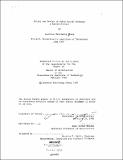| dc.contributor.advisor | Anne Vernez-Moudon. | en_US |
| dc.contributor.author | Cheng, Lawrence Kai-Leung | en_US |
| dc.contributor.other | Massachusetts Institute of Technology. Dept. of Architecture. | en_US |
| dc.date.accessioned | 2011-08-18T19:02:55Z | |
| dc.date.available | 2011-08-18T19:02:55Z | |
| dc.date.copyright | 1980 | en_US |
| dc.date.issued | 1980 | en_US |
| dc.identifier.uri | http://hdl.handle.net/1721.1/65199 | |
| dc.description | Thesis (M. Arch.)--Massachusetts Institute of Technology, Dept. of Architecture, 1980. | en_US |
| dc.description | MICROFICHE COPY AVAILABLE IN ARCHIVES AND ROTCH. | en_US |
| dc.description | Includes bibliographical references. | en_US |
| dc.description.abstract | The objective of this thesis is to understand the term " HOUSING" as a verb. This implies that housing is a process which includes three major stages. First, the planning POLICY stage determines distributions of resources, methods of production, and programs of activities. Second, the architectural DESIGN stage transforms these objectives into physical environments through technological means and spatial articulations. Third, the INHABITATION stage involves management of the resulted environment, and its use by inhabitants. The quality of the end product and the user's satisfaction with the product depend on who is making decisions in the three stages. In modern Western urban centers, the results of two centuries of industrialization and urbanization, housing for low-income groups is subsidized by government at federal and local levels. Urban social housing projects, with few exceptions, are products of a hierarchical structuring of the three stages of housing. This structure is possible only when it is controlled by a centralized authority. The problems of this rigidity in urban social housing are manifested in its financial strain on public resources, management crisis, and rapid obsolescence. Also, these problems reflect a mismatch between the needs define d by public agencies and the actual needs of the people housed. Exceptional cases to this mismatch reveal conflicts and contradictions in the present system of housing production, and suggest alternatives to achieve a dialectic and productive interaction between all three stages (POLICY , DESIGN AND INHABITATION) in the housing process. Two major issues addressed in this thesis are the characteristics of alternative housing processes and the role of the architect in such processes. | en_US |
| dc.description.statementofresponsibility | by Lawrence Kai-Leung Cheng. | en_US |
| dc.format.extent | 161 leaves | en_US |
| dc.language.iso | eng | en_US |
| dc.publisher | Massachusetts Institute of Technology | en_US |
| dc.rights | M.I.T. theses are protected by
copyright. They may be viewed from this source for any purpose, but
reproduction or distribution in any format is prohibited without written
permission. See provided URL for inquiries about permission. | en_US |
| dc.rights.uri | http://dspace.mit.edu/handle/1721.1/7582 | en_US |
| dc.subject | Architecture. | en_US |
| dc.subject.lcsh | Housing | en_US |
| dc.subject.lcsh | Housing policy | en_US |
| dc.subject.lcsh | Public housing | en_US |
| dc.subject.lcsh | Architecture, Domestic | en_US |
| dc.title | Policy and design in urban social housing : a reconciliation | en_US |
| dc.type | Thesis | en_US |
| dc.description.degree | M.Arch. | en_US |
| dc.contributor.department | Massachusetts Institute of Technology. Department of Architecture | |
| dc.identifier.oclc | 07441200 | en_US |
